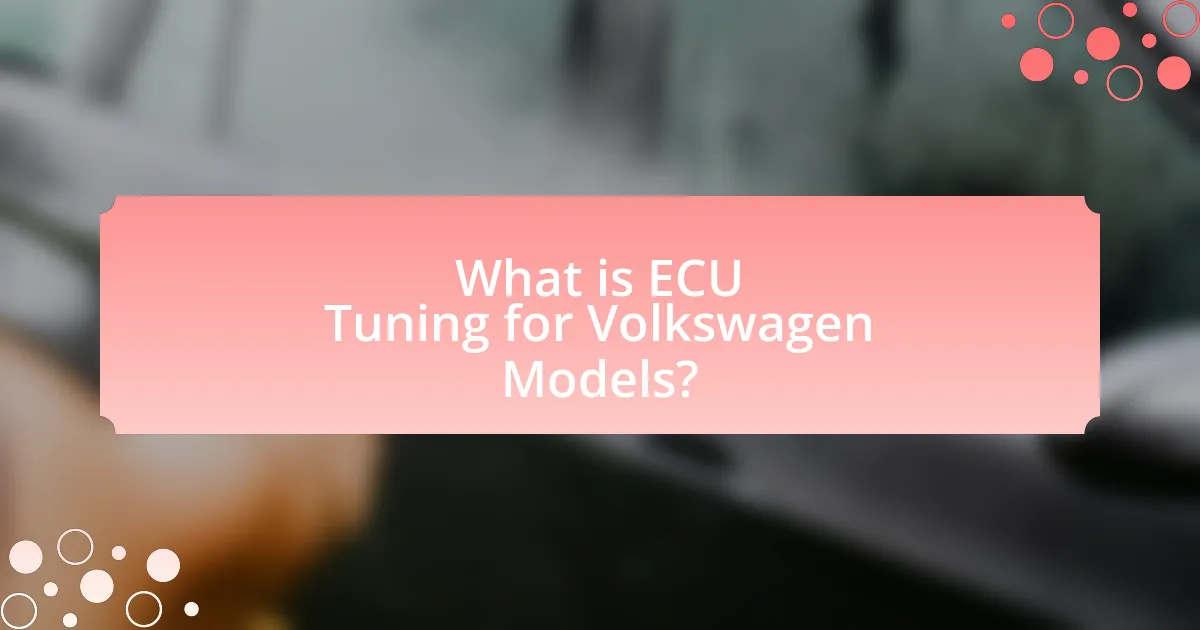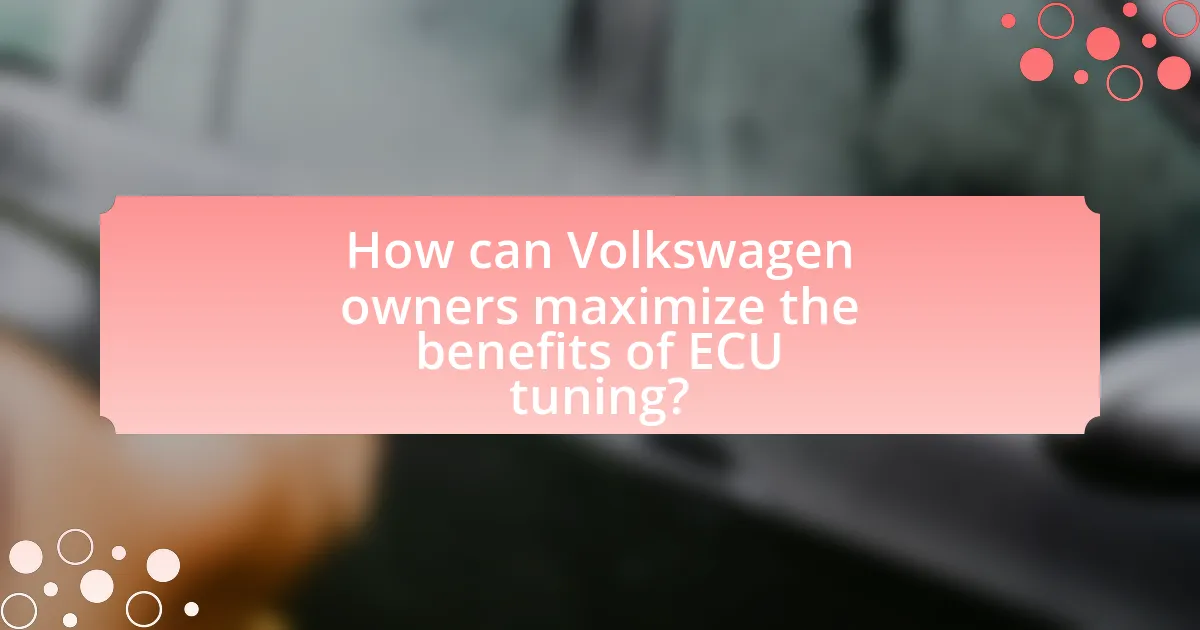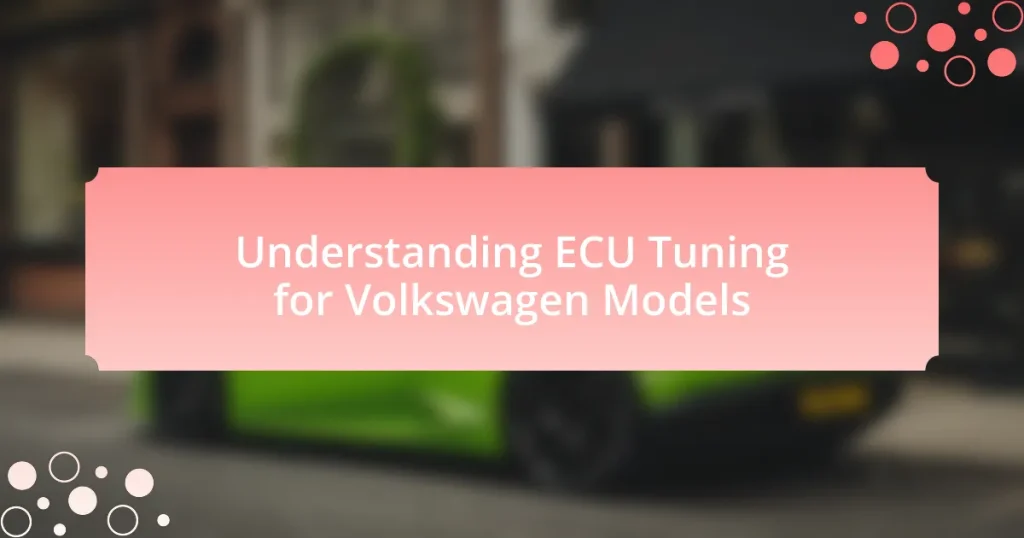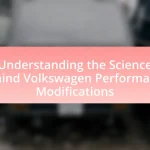ECU tuning for Volkswagen models refers to the modification of the engine control unit’s software to enhance performance, fuel efficiency, and responsiveness. This process involves adjusting parameters such as fuel maps, ignition timing, and boost levels, resulting in significant improvements in horsepower and torque, with gains of up to 20-30% possible. The article explores how ECU tuning works, the different types available, including Stage 1, Stage 2, and Stage 3 tuning, and the benefits it provides, such as improved fuel efficiency and performance. Additionally, it addresses the risks associated with tuning, including potential engine damage and warranty voiding, and offers best practices for ensuring reliability post-tuning.

What is ECU Tuning for Volkswagen Models?
ECU tuning for Volkswagen models involves modifying the engine control unit (ECU) software to enhance vehicle performance, fuel efficiency, and responsiveness. This process typically includes adjusting parameters such as fuel maps, ignition timing, and boost levels to optimize engine output. Studies have shown that ECU tuning can lead to significant improvements in horsepower and torque, with some Volkswagen models experiencing gains of up to 20-30% in power after tuning.
How does ECU Tuning work in Volkswagen vehicles?
ECU tuning in Volkswagen vehicles involves modifying the engine control unit’s software to enhance performance, fuel efficiency, or responsiveness. This process typically includes adjusting parameters such as fuel maps, ignition timing, and boost pressure to optimize engine output. The tuning is often achieved through specialized software and tools that interface with the ECU, allowing for real-time changes and diagnostics. Many Volkswagen models have a robust aftermarket support community, providing access to various tuning options and performance upgrades, which can lead to significant improvements in horsepower and torque.
What are the key components of the ECU in Volkswagen models?
The key components of the ECU in Volkswagen models include the microcontroller, memory (both ROM and RAM), input/output interfaces, and sensors. The microcontroller serves as the brain of the ECU, processing data and executing control functions. Memory stores the software and calibration data necessary for vehicle operation, while input/output interfaces facilitate communication with various vehicle systems. Sensors provide real-time data on engine performance, vehicle speed, and other critical parameters, enabling the ECU to optimize performance and efficiency. These components work together to ensure the vehicle operates smoothly and meets emission standards.
How does the ECU control engine performance in Volkswagen cars?
The Engine Control Unit (ECU) in Volkswagen cars regulates engine performance by managing fuel injection, ignition timing, and air intake based on real-time data from various sensors. This precise control allows the ECU to optimize combustion efficiency, enhance power output, and reduce emissions. For instance, the ECU adjusts the air-fuel mixture to ensure optimal combustion under different driving conditions, which is critical for maintaining performance and fuel economy. Additionally, the ECU utilizes feedback from sensors such as the oxygen sensor and mass airflow sensor to continuously refine engine parameters, ensuring that the vehicle operates efficiently and responsively.
What are the different types of ECU tuning available for Volkswagen models?
The different types of ECU tuning available for Volkswagen models include remapping, chip tuning, and piggyback tuning. Remapping involves altering the vehicle’s existing software to enhance performance, often resulting in increased horsepower and torque. Chip tuning replaces the original ECU chip with a modified one, allowing for similar performance enhancements. Piggyback tuning adds an additional module that works alongside the factory ECU to optimize performance without altering the original software. Each method provides distinct advantages and can significantly improve the driving experience of Volkswagen vehicles.
What is Stage 1 tuning and how does it affect performance?
Stage 1 tuning is an initial level of engine tuning that optimizes a vehicle’s performance by adjusting the engine control unit (ECU) parameters without requiring hardware modifications. This tuning typically increases horsepower and torque by recalibrating fuel maps, ignition timing, and boost levels, resulting in improved throttle response and acceleration. For example, a Volkswagen model can see a performance increase of 10-20% in power output after Stage 1 tuning, depending on the specific engine and existing conditions. This enhancement is achieved through software adjustments that maximize the efficiency of the engine’s existing components.
What distinguishes Stage 2 and Stage 3 tuning from Stage 1?
Stage 2 and Stage 3 tuning are distinguished from Stage 1 by the level of modifications and performance enhancements applied to the vehicle’s engine and supporting systems. Stage 1 tuning typically involves software adjustments to optimize engine performance without significant hardware changes, focusing on improving efficiency and power within factory specifications. In contrast, Stage 2 tuning introduces upgraded components such as a high-flow exhaust system and enhanced intake systems, allowing for greater airflow and increased power output. Stage 3 tuning further escalates this by incorporating extensive modifications, including turbocharger upgrades, intercoolers, and additional engine management systems, resulting in significantly higher horsepower and torque levels. These distinctions highlight the progressive nature of tuning stages, with each subsequent stage requiring more extensive modifications to achieve higher performance metrics.
What benefits does ECU tuning provide for Volkswagen owners?
ECU tuning provides Volkswagen owners with enhanced engine performance, improved fuel efficiency, and increased horsepower. By recalibrating the engine control unit, Volkswagen vehicles can achieve optimal air-fuel ratios and ignition timing, resulting in better throttle response and acceleration. Studies indicate that ECU tuning can lead to a 10-20% increase in horsepower and torque, depending on the model and modifications. Additionally, improved fuel efficiency can save owners money on fuel costs over time, making ECU tuning a cost-effective upgrade for many Volkswagen enthusiasts.
How can ECU tuning improve fuel efficiency in Volkswagen models?
ECU tuning can improve fuel efficiency in Volkswagen models by optimizing engine parameters such as fuel-air mixture, ignition timing, and turbocharger boost levels. This optimization allows the engine to operate more efficiently, reducing fuel consumption while maintaining or enhancing performance. Studies have shown that properly tuned ECUs can lead to fuel savings of up to 15% in some cases, as they enable the engine to achieve a better balance between power output and fuel usage.
What performance enhancements can be expected from ECU tuning?
ECU tuning can enhance vehicle performance by increasing horsepower, improving torque, and optimizing fuel efficiency. By recalibrating the engine control unit, ECU tuning adjusts parameters such as air-fuel mixture, ignition timing, and boost pressure, leading to a more efficient combustion process. For example, studies have shown that ECU tuning can result in horsepower gains of 10-30% depending on the vehicle and modifications made. Additionally, improved throttle response and acceleration are common benefits, as the tuning allows for quicker adjustments to engine performance under varying driving conditions.

What are the risks associated with ECU tuning for Volkswagen models?
The risks associated with ECU tuning for Volkswagen models include potential engine damage, voiding of warranties, and legal issues regarding emissions compliance. Engine damage can occur due to increased stress on components not designed for higher performance levels, leading to failures such as overheating or premature wear. Additionally, manufacturers often void warranties if modifications like ECU tuning are detected, leaving owners responsible for repair costs. Furthermore, tuning may result in non-compliance with emissions regulations, which can lead to fines or penalties, as many regions enforce strict environmental laws.
How can ECU tuning affect vehicle warranty and reliability?
ECU tuning can void a vehicle’s warranty and impact reliability. Manufacturers often state that modifications to the engine control unit can lead to warranty claims being denied, as these changes may cause issues not covered under standard warranty terms. For example, a study by the Automotive Warranty Association indicates that 60% of manufacturers will reject warranty claims if they detect ECU tuning, citing potential damage or performance issues as reasons. Additionally, while tuning can enhance performance, it may also lead to increased wear on engine components, thereby affecting long-term reliability.
What potential issues can arise from improper tuning?
Improper tuning can lead to several potential issues, including decreased engine performance, increased emissions, and potential engine damage. When the engine control unit (ECU) is not calibrated correctly, it may result in inefficient fuel-air mixtures, causing the engine to run poorly and consume more fuel. Additionally, improper tuning can elevate exhaust emissions beyond regulatory limits, leading to environmental concerns and potential legal penalties. Furthermore, excessive tuning can stress engine components, leading to premature wear or catastrophic failure, as evidenced by studies showing that misconfigured ECUs can increase the likelihood of mechanical failures by up to 30%.
How does tuning impact emissions compliance in Volkswagen vehicles?
Tuning can negatively impact emissions compliance in Volkswagen vehicles by altering the engine’s performance parameters, which may lead to increased emissions of pollutants. When the Engine Control Unit (ECU) is modified, it can disable or bypass emissions control systems, such as catalytic converters or exhaust gas recirculation, resulting in non-compliance with regulatory standards. For instance, the Environmental Protection Agency (EPA) has documented cases where tuning led to vehicles exceeding allowable limits for nitrogen oxides and particulate matter, contributing to environmental harm and legal repercussions for manufacturers.
What precautions should be taken before tuning a Volkswagen ECU?
Before tuning a Volkswagen ECU, it is essential to back up the original ECU data to prevent loss of factory settings. This precaution ensures that if the tuning process fails or causes issues, the vehicle can be restored to its original state. Additionally, verifying that the vehicle’s hardware is compatible with the intended tuning modifications is crucial, as mismatched components can lead to performance problems or damage. It is also advisable to check for any existing fault codes and resolve them prior to tuning, as unresolved issues can affect the tuning outcome. Finally, using a reputable tuning software or service is vital to ensure that the tuning process is executed correctly and safely.
What should be considered when choosing a tuning service or software?
When choosing a tuning service or software, it is essential to consider the service’s compatibility with specific Volkswagen models. Compatibility ensures that the tuning software can effectively communicate with the vehicle’s ECU, allowing for optimal performance enhancements. Additionally, the reputation of the tuning service is crucial; services with positive reviews and proven track records are more likely to deliver reliable results. Furthermore, the level of customer support provided by the tuning service can significantly impact the user experience, as responsive support can assist with troubleshooting and adjustments. Lastly, the availability of customizable tuning options allows users to tailor the performance enhancements to their specific driving needs and preferences, making it a vital factor in the decision-making process.
How can owners ensure their vehicle remains reliable post-tuning?
Owners can ensure their vehicle remains reliable post-tuning by regularly monitoring engine performance and conducting routine maintenance. This includes checking for any error codes, monitoring fuel trims, and ensuring that all components are functioning within their specified parameters. Regular oil changes, air filter replacements, and spark plug inspections are essential to maintain engine health after tuning. Additionally, using high-quality fuel and ensuring that the tuning software is compatible with the vehicle’s hardware can prevent potential issues. Studies show that vehicles with proper maintenance post-tuning experience fewer mechanical failures, reinforcing the importance of these practices for reliability.

How can Volkswagen owners maximize the benefits of ECU tuning?
Volkswagen owners can maximize the benefits of ECU tuning by selecting a reputable tuning company that specializes in Volkswagen models and ensuring that the tuning is tailored to their specific vehicle and driving style. This approach enhances performance, fuel efficiency, and overall driving experience. Research indicates that properly executed ECU tuning can lead to power increases of up to 20-30% in certain Volkswagen models, depending on the engine type and modifications. Additionally, regular maintenance and using high-quality fuel can further optimize the results of the tuning, ensuring that the vehicle operates efficiently and reliably post-tuning.
What maintenance practices should be followed after ECU tuning?
After ECU tuning, regular maintenance practices include monitoring engine performance, checking for error codes, and ensuring proper fluid levels. Engine performance should be assessed through periodic diagnostics to confirm that the tuning has not introduced any issues. Checking for error codes is essential, as it helps identify any malfunctions that may arise post-tuning. Additionally, maintaining proper fluid levels, including oil and coolant, is crucial to ensure optimal engine operation and longevity. These practices are supported by automotive maintenance guidelines, which emphasize the importance of ongoing checks after modifications to ensure reliability and performance.
How often should performance checks be conducted post-tuning?
Performance checks should be conducted at least every 1,000 miles after ECU tuning. This frequency allows for monitoring the vehicle’s performance and ensuring that the tuning adjustments are functioning as intended. Regular checks help identify any potential issues early, maintaining optimal performance and reliability.
What modifications can complement ECU tuning for better results?
Performance modifications that can complement ECU tuning for better results include upgrading the intake system, installing a high-performance exhaust system, and enhancing the fuel system. Upgrading the intake system allows for improved airflow, which can lead to better combustion efficiency. A high-performance exhaust system reduces back pressure, enabling the engine to expel exhaust gases more effectively, thus improving overall performance. Enhancing the fuel system, such as by installing larger fuel injectors or a high-flow fuel pump, ensures that the engine receives the optimal amount of fuel to match the increased airflow from the intake and exhaust modifications. These modifications work synergistically with ECU tuning to maximize engine performance and efficiency.
What are the best practices for ECU tuning in Volkswagen models?
The best practices for ECU tuning in Volkswagen models include using a reputable tuning software, ensuring compatibility with the specific model, and conducting thorough diagnostics before and after tuning. Utilizing established software like VCDS or OBD11 allows for precise adjustments tailored to the vehicle’s specifications. Compatibility is crucial, as different Volkswagen models may have unique ECU architectures that require specific tuning approaches. Conducting diagnostics ensures that the vehicle is in optimal condition and helps identify any pre-existing issues that could affect performance post-tuning. Additionally, monitoring performance metrics such as air-fuel ratios and boost levels during and after tuning can validate the effectiveness of the modifications.
How can owners choose the right tuning software for their needs?
Owners can choose the right tuning software by assessing their specific vehicle model, tuning goals, and software compatibility. For instance, Volkswagen models often require software that is tailored to their unique ECU architecture, ensuring optimal performance and reliability. Additionally, owners should consider user reviews and expert recommendations, as well as the availability of support and updates from the software provider. Research indicates that software like APR and Unitronic are popular among Volkswagen enthusiasts due to their proven track records and extensive tuning options.
What common troubleshooting tips should be followed after tuning?
Common troubleshooting tips after tuning include checking for error codes, monitoring engine performance, and verifying fuel trims. Error codes can indicate issues that arose during tuning, while monitoring engine performance helps ensure that the vehicle operates within expected parameters. Verifying fuel trims ensures that the air-fuel mixture is optimal, which is crucial for engine efficiency and performance. These steps are essential for identifying and resolving potential problems that may arise post-tuning.


